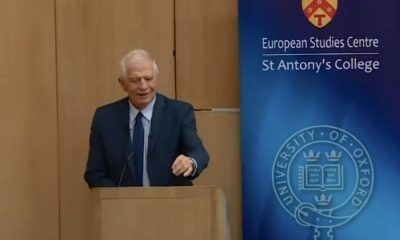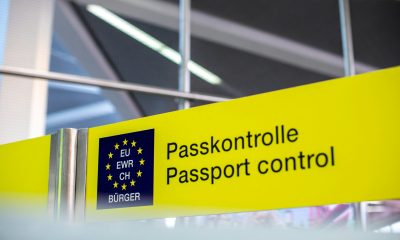EU
#Romanija skatina geresnę prieigą prie individualizuotos medicinos

 The Brussels-based European Alliance for Personalised Medicine (EAPM) yesterday (27 June) held a meeting in Bucharest aimed at increasing access to personalised medicine for Romanian citizens, rašo EAPM vykdomasis direktorius Denisas Horgan.
The Brussels-based European Alliance for Personalised Medicine (EAPM) yesterday (27 June) held a meeting in Bucharest aimed at increasing access to personalised medicine for Romanian citizens, rašo EAPM vykdomasis direktorius Denisas Horgan.
It was part of EAPM’s ongoing ‘SMART Outreach’ programme and was attended by high-level stakeholders, the including state secretary at the ministry of health of Romania, Corina Pop. ‘SMART’ stands for Smaller Member states And Regions Together, and the Alliance has been holding events in several EU member states to discuss ways to improve access, not just in the bigger countries of the union, but also in less big but equally forward-looking ones, too. EAPM’s 2015 conference introduced the ‘SMART’ concept, and the Alliance has been expanding this by taking its message directly to EU countries, especially the smaller ones.
These, often relatively new, member states have been active in shaping health policy at European level and can now act as vital policy entrepreneurs pursuing normative policy agendas. This has been demonstrated in the recent past by, for example, Slovenia. That smaller country had a major role in promoting cancer policy development at EU level. In general, Europe’s health policies need to recognise and tackle the inherent health system vulnerabilities faced, specifically, by smaller countries and in the regions of the larger ones.
EAPM has therefore called for adoption of its SMART approach at EU executive level. Already the idea has been a great success, involving medicines bodies, national health ministers and cross-sectional stakeholders, all working with EAPM to move personalised medicine to the next level.
Overall, European health policy needs to become better attuned to the specific challenges facing the health systems in smaller states and regions. Between EAPM and its partners in SMART Outreach, the Alliance believes that if they ‘build it, they will come’. The ‘they’ in this context are multi-stakeholders in this brave new world of genetics, imaging, cutting-edge IVDs and more. The plan is to build a better healthcare future for all Europeans through shared decision making and cooperation. Personalised (or precision) medicine hit the global headlines when, in January 2015, the former US President Barack Obama launched the Precision Medicine Initiative (PMI) with the aim of developing “the means of disease prevention and treatment, which takes into account people’s individual variations in genes, living environment, and lifestyle.”
Personalised medicine is based on the developments in the field of genome sequencing, biomedical technologies, and the ability to analyse and store medical data. Later in December 2015, the then presidency of the EU, Luxembourg, produced landmark Council Conclusions aimed at improving access to this fast-moving form of targeted treatment. Personalised medicine has the goal of giving the right treatment to the right patient at the right time, in a seismic shift away from ‘one-size-fits-all’ models that no longer work. Unfortunately, take-up and integration into Europe’s healthcare systems has not been a swift as it could be, but the tide is turning. At the meeting in Bucharest, for example, Romania’s state secretary at the ministry of health, Corina Pop, identified specific issues facing Romania, saying: “We need to develop a National Cancer Plan which will include personalised medicine principles mandatorily, from screening to treatment.”
She added: “We also need to see the establishment of a National Cancer Registry and other IT infrastructures aiming to develop an integrated ‘Big’ and ‘Smart’ data system.
“On top of this, we need to define fast tracks of evaluation and reimbursement for immunotherapies, personalised drugs and genetic testing, which demonstrate their value quickly in clinical trials and are recognised as such by the European Medicines Agency.” Former European commissioner for health and consumer sffairs David Byrne, who is also co-chair of EAPM, said: “Romania, like all EU countries has huge healthcare challenges as populations age and co-morbidities increase.
“Among the recommendations emerging today for Romania are the establishment of a national network of excellence centres in precision medicine, with accurate diagnosis capabilities.” Marius Geanta, the president of the Centre for Innovation in Medicine, said that he was delighted that a SMART Outreach forum was being held in Bucharest. Geanta emphasised the need in his country for: “the inclusion of predictive genetic testing in other national programmes, such as cardiology”, as well as “the inclusion of personalised medicine methods among the quality criteria in the accreditation of hospitals”.
The Alliance’s executive director Denis Horgan, meanwhile, said: “Romania, along with other EU countries, needs to work towards a definition of legislation in matters of compassionate use and other mechanisms of early access, which could help with access, including to immunotherapies.”
Horgan added that what is also necessary is the development of infrastructure for clinical studies in order to facilitate early access of patients, including to immuno-oncological medicinal products.” “There is a long way to go,” Horgan said, but the SMART Outreach programmes are there to be built upon. “And, if we build it, I am confident ‘they’ will come”, the Alliance executive director. Among others attending the forum in Bucharest were Richard Ablin, Professor of Pathology, University of Arizona College of Medicine, Diana Paun, Health Advisor Romanian Presidency, Laszlo Attila, the President of the Health Commission Senate of Romania, plus several academics, health-care professionals and insurers.
Pasidalinkite šiuo straipsniu:
-

 Konfliktaiprieš 5 dienas
Konfliktaiprieš 5 dienasKazachstanas žengia: Armėnijos ir Azerbaidžano takoskyros tiltas
-

 Bendra užsienio ir saugumo politikaprieš 3 dienas
Bendra užsienio ir saugumo politikaprieš 3 dienasES užsienio politikos vadovas bendradarbiauja su JK, vykstant pasaulinei konfrontacijai
-

 Rumunijaprieš 5 dienas
Rumunijaprieš 5 dienasRusijos pasisavinto Rumunijos nacionalinio lobio grąžinimas ES debatuose užima pirmąją vietą
-

 NATOprieš 4 dienas
NATOprieš 4 dienasPiktybė iš Maskvos: NATO perspėja apie Rusijos hibridinį karą























